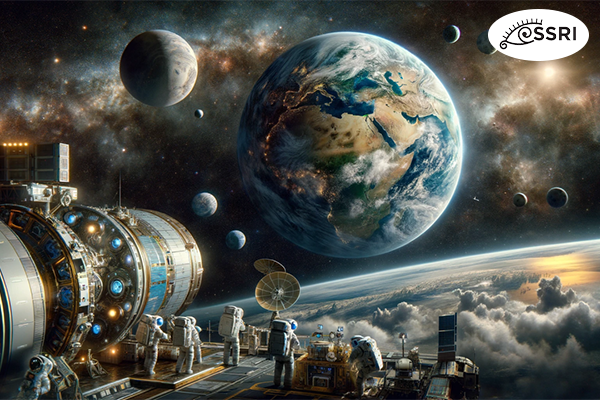Exploring the Cosmos
Space exploration stands as a beacon of rapidly advancing science, characterized by hefty financial investments and cutting-edge technologies. The quest for life beyond our planet has been a perennial pursuit, driving numerous research endeavors and discoveries. From ancient philosophies pondering the arrangement of stars to our own space station orbiting Earth, the trajectory of space exploration has been remarkable.
Throughout history, space exploration has yielded developments, equipment, and discoveries that significantly enhance life on Earth. Today, specialized organizations such as the Aerospace Industries Association and the American Astronautical Society spearhead space exploration, pushing the boundaries of human knowledge and capability.
In this essay, we delve into the intricacies of space exploration, considering its myriad advantages and disadvantages for humanity. We navigate ethical quandaries that arise from venturing into the unknown and explore the implications of our cosmic pursuits. Furthermore, we embark on a journey into the future, offering insights and predictions about the trajectory of this ever-evolving industry.
As we gaze towards the stars and venture into uncharted territories, we unravel the mysteries of the universe while grappling with the complexities of our own existence. Through introspection and exploration, we strive to unlock the boundless potential that lies beyond our planet’s confines, shaping the future of humanity and the cosmos alike.

Exploring the Cosmos: Unveiling the True Impact of Space Exploration
Contrary to popular belief, space exploration profoundly influences the lives of ordinary individuals, enriching millions each day. Technologies born from space studies now permeate various facets of life, from advancements in medicine to groundbreaking experiments (Rai et al., 2016). However, alongside its benefits, space research raises ethical dilemmas surrounding colonization, financial allocations, and ecological concerns, leaving many questions unanswered as the field advances.
In the era of Gagarin and pioneering space voyages, being a cosmonaut held immense prestige, garnering respect and evoking a sense of romance. Yet, in the contemporary landscape, skepticism abounds, with some viewing space exploration as an extravagant diversion of governmental funds, distant from the everyday concerns of the populace.
As attitudes towards space research evolve, it becomes imperative to scrutinize both its merits and drawbacks. This essay aims to elucidate the nuanced perspectives surrounding space exploration, shedding light on its transformative impact and ethical complexities. By examining its positive contributions and lingering uncertainties, we strive to present a comprehensive and compelling argument, illuminating the true essence of humanity’s cosmic endeavors.
Unveiling the Hidden Rewards: Exploring the Benefits of Space Exploration
While the benefits of space exploration may not always be immediately apparent to the average person, they hold immense value for society at large. Space research goes beyond the boundaries of our planet, driving advancements across various scientific disciplines and acting as a catalyst for innovation and inspiration (Panesor, 2009). Moreover, it sparks the curiosity of young professionals in fields such as chemistry, biology, and engineering, drawing them into the realm of space exploration (Panesor, 2009).
This symbiotic relationship between academia and research centers fuels a cycle of progress, where students contribute fresh perspectives and innovative ideas, while institutions provide opportunities for career advancement and financial stability. However, the benefits extend far beyond monetary gains, with the societal impact of space exploration proving immeasurable.
Research conducted by Jackson et al. (2019) emphasizes the crucial role of women in space exploration, highlighting their contributions in reshaping social dynamics and addressing inequality. The inclusion of women astronauts has led to a more diverse and inclusive space industry, utilizing varied perspectives and approaches for increased efficiency and effectiveness.
The benefits of space exploration go beyond economic value, enriching society through scientific progress, inspiring education, and advancing societal norms. As we delve further into the cosmos, it’s essential to recognize and celebrate how space exploration enhances our collective well-being and deepens our understanding of the universe.
Unveiling Costly Realities: Exploring the Downsides of Space Exploration
Space exploration has long faced criticism for its exorbitant costs, with critics arguing that the immense financial investment could be better utilized elsewhere. This industry ranks among the most expensive, demanding significant intellectual resources and costly equipment (details from “Cost of Space Exploration,” 1961). Baum (2009) advocates for a cost-benefit analysis, emphasizing the importance of considering ethical risks and alternative budget allocations. Furthermore, Baum (2016) raises concerns regarding the feasibility of colonization, questioning the wisdom of seeking refuge in space when humanity struggles to preserve nature on Earth, exacerbating ecological challenges in the process.
While not all space exploration endeavors come with astronomical price tags, costs can vary depending on the nature and objectives of the research (“International Space Exploration Coordination Group,” 2013). Leveraging data from previous experiments can help mitigate expenses (Battat, 2012), but this approach demands significant time and effort from research teams, making it a challenging endeavor. Additionally, the transition from experimental innovations to practical applications in everyday life can be slow and arduous, taking years or even decades to materialize.
Despite these drawbacks, perhaps the most significant disadvantage of space exploration lies in its intangible impact on society. While the benefits of space research may be evident to experts in the field, the general public often struggles to discern its real-world implications, leading to skepticism and criticism of the industry. As we navigate the complexities of space exploration, it is essential to critically evaluate its costs and benefits while striving for transparency and accountability in resource allocation.
Emerging Horizons: The Growing Landscape of Space Exploration and Its Prospective Impacts
As the realm of space exploration expands, its influence extends across political, social, and economic dimensions, shaping the trajectory of nations and societies. However, the rapid escalation of investment in this industry raises concerns about potential financial strains and crises within countries. Despite these apprehensions, the future holds promise for significant non-material benefits and unforeseen advantages stemming from space exploration endeavors.
Recent advancements in space technology are poised to revolutionize various scientific fields, with innovations seamlessly integrated into numerous domains. Space-derived technologies, such as robotic hands and neurotransmitter advancements, are transforming industries, saving lives, and enhancing human capabilities (Crawford, 2019). Moreover, the intellectual demands inherent in space exploration are fostering cultural and cognitive growth among individuals passionate about the cosmos, driving innovation, and expanding human knowledge.
The quest for colonization beyond Earth’s confines carries profound implications for societal attitudes toward our planet and its natural ecosystems. Should the search for habitable worlds yield no viable options, it may catalyze a collective awakening to the fragility of our own planet and the urgent need for environmental stewardship. This heightened awareness could inspire greater conscientiousness and care for Earth’s delicate ecological balance, fostering a more sustainable and environmentally conscious society.
As we chart the course of space exploration’s evolution, it is imperative to anticipate and prepare for its far-reaching impacts, harnessing its potential to drive positive change and foster a deeper understanding of our place in the cosmos.
Navigating Space Exploration: Minimizing Environmental Impact and Maximizing Benefits
To embark on space exploration with minimal ecological disruption and maximum societal benefit, several strategies can be employed.
Firstly, leveraging previous experiences and insights is paramount. By meticulously analyzing past missions and outcomes, researchers can identify opportunities to optimize costs and streamline the development of new technologies. This approach not only reduces financial burdens but also accelerates progress by building upon existing knowledge and innovations.
Secondly, effective communication is essential. Public perception plays a significant role in shaping governmental policies and funding allocations for space exploration initiatives. Therefore, dedicated specialists in public relations should be engaged to articulate the importance of space exploration to society at large. By highlighting tangible benefits, such as technological advancements and scientific discoveries, these professionals can garner public support and foster a deeper appreciation for the value of space exploration.
Lastly, collaboration on a global scale is imperative. Space exploration should be viewed as a collective endeavor, transcending national boundaries and uniting developed nations in a shared pursuit of scientific discovery. By pooling resources and expertise, countries can reduce individual financial burdens and enhance the efficiency of space exploration efforts. This collaborative approach not only fosters international cooperation but also accelerates progress towards common goals, ultimately advancing humanity’s understanding of the cosmos.
Charting the Future: Balancing the Scales of Space Exploration
As we navigate the complexities of 21st-century space exploration, it’s evident that this endeavor presents both promise and peril. The benefits extend beyond mere economics, enriching our social fabric and expanding the horizons of human knowledge. Yet, the formidable costs associated with these endeavors cannot be ignored, prompting us to seek innovative solutions to minimize financial burdens.
Fortunately, avenues for improvement abound. Drawing upon the wisdom of past generations and optimizing existing processes can help mitigate costs and maximize efficiency. Moreover, ethical considerations must remain at the forefront of our endeavors, prompting thoughtful reflection on ecological sustainability and moral imperatives.
Certainly, space exploration emerges as a captivating frontier in 21st-century science. Balancing aspiration with pragmatism is key as we navigate towards a future where the benefits of space exploration are harnessed responsibly, ensuring the stewardship of our planet and its resources.
Exploring the Cosmos: Sources of Knowledge
- Battat, J. A. (2012). Technology and architecture: Informing investment decisions for the future of human exploration [Unpublished doctoral dissertation]. Massachusetts Institute of Technology.
- Baum, S. (2009). Cost-benefit analysis of space exploration: Some ethical considerations. Space Policy, 25(2), 75–80.
- Baum, S. (2016). The ethics of outer space: A consequentialist perspective. The Ethics of Space Exploration, 2(1), 109–123.
- International Space Exploration Coordination Group. (2013). Benefits Stemming from Space Exploration.
- American Association for the Advancement of Science. (1961). Cost of Space Exploration. Science, 133(3470), 2055–2055.
- Crawford, I. (2019). Widening perspectives: The intellectual and social benefits of Astrobiology, Big History, and the exploration of space. Journal of Big History, 3(3), 205–224.
- Jacksona, M. S., Knezek, P., Silimon-Hill, M. D., & Cross, M. A. (2019). Women in exploration: Lessons From the past as humanity reaches deep space. International Astronautical Congress, 1(1), 1–15.
- Krichevsky, S. (2018). Super global projects and environmentally friendly technologies used in space exploration: Realities and prospects of the Space Age. Philosophy and Cosmology, 20(1), 92–105.
- Panesor, T. (2009). Space: Exploration and exploitation in a modern society. Institute of physics. Web.
- Rai, A., Robinson, J. A., Tate-Brown, J., Buckley, N., Zell, M., Tasaki, K., & Pignataro, S. (2016). Expanded benefits for humanity from the International Space Station. Acta Astronautica, 126(2), 463–474.




